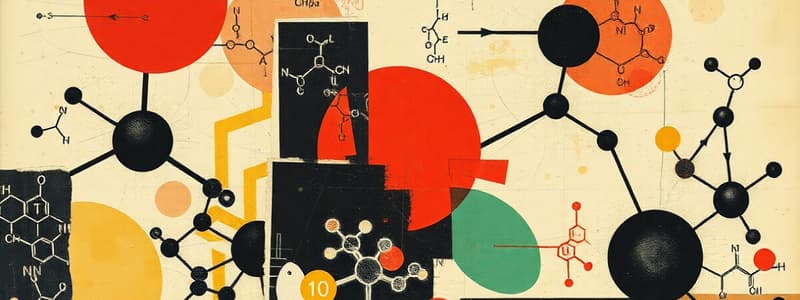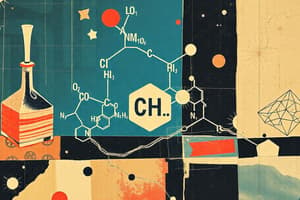Podcast
Questions and Answers
What is a primary use of feedstocks in chemical synthesis?
What is a primary use of feedstocks in chemical synthesis?
- To create chemical reactions
- To separate hydrocarbons
- To enhance petroleum products
- To create a wide variety of chemical compounds (correct)
Which process separates hydrocarbons based on their boiling points?
Which process separates hydrocarbons based on their boiling points?
- Hydrogenation
- Cracking
- Isomerization
- Fractional distillation (correct)
What does structural isomerism in hydrocarbons indicate?
What does structural isomerism in hydrocarbons indicate?
- Same boiling points for different compounds
- Increased molecular weight with the same properties
- Same molecular formula with different atom arrangements (correct)
- Different molecular formulas with similar structures
What do the IUPAC nomenclature rules primarily help with?
What do the IUPAC nomenclature rules primarily help with?
What is one of the environmental concerns associated with burning hydrocarbons?
What is one of the environmental concerns associated with burning hydrocarbons?
What is the general formula for alkenes?
What is the general formula for alkenes?
Which type of hydrocarbon is characterized by having a benzene ring?
Which type of hydrocarbon is characterized by having a benzene ring?
Which of the following hydrocarbons is an example of an alkene?
Which of the following hydrocarbons is an example of an alkene?
What is the main characteristic of alkanes in terms of their bond types?
What is the main characteristic of alkanes in terms of their bond types?
Which reaction type is commonly associated with unsaturated hydrocarbons?
Which reaction type is commonly associated with unsaturated hydrocarbons?
What happens to the boiling point of hydrocarbons as the chain length increases?
What happens to the boiling point of hydrocarbons as the chain length increases?
How do hydrocarbons generally behave in water?
How do hydrocarbons generally behave in water?
What is the primary use of hydrocarbons in industrial chemistry?
What is the primary use of hydrocarbons in industrial chemistry?
Flashcards
Hydrocarbons
Hydrocarbons
Organic compounds made only of carbon and hydrogen atoms.
Alkanes
Alkanes
Saturated hydrocarbons with only single bonds between carbons.
Alkane General Formula
Alkane General Formula
CnH2n+2
Alkenes
Alkenes
Signup and view all the flashcards
Alkene General Formula
Alkene General Formula
Signup and view all the flashcards
Alkynes
Alkynes
Signup and view all the flashcards
Alkyne General Formula
Alkyne General Formula
Signup and view all the flashcards
Aromatic Hydrocarbons
Aromatic Hydrocarbons
Signup and view all the flashcards
Fossil Fuels
Fossil Fuels
Signup and view all the flashcards
Addition Reactions
Addition Reactions
Signup and view all the flashcards
Combustion
Combustion
Signup and view all the flashcards
Feedstock for chemical synthesis
Feedstock for chemical synthesis
Signup and view all the flashcards
Petroleum products
Petroleum products
Signup and view all the flashcards
Fractional distillation
Fractional distillation
Signup and view all the flashcards
Structural Isomerism
Structural Isomerism
Signup and view all the flashcards
Hydrocarbon isomers
Hydrocarbon isomers
Signup and view all the flashcards
IUPAC Nomenclature
IUPAC Nomenclature
Signup and view all the flashcards
Environmental Concerns
Environmental Concerns
Signup and view all the flashcards
Greenhouse gases
Greenhouse gases
Signup and view all the flashcards
Oil spills
Oil spills
Signup and view all the flashcards
Incomplete Combustion
Incomplete Combustion
Signup and view all the flashcards
Hydrocarbon leakage
Hydrocarbon leakage
Signup and view all the flashcards
Study Notes
Introduction
- Hydrocarbons are organic compounds consisting entirely of carbon and hydrogen atoms.
- They are the primary constituents of fossil fuels (coal, oil, and natural gas).
- They are important sources of energy and feedstocks for various industrial processes.
- Hydrocarbons exhibit a wide range of physical and chemical properties, depending on the arrangement of their carbon atoms.
Types of Hydrocarbons
- Alkanes: These are saturated hydrocarbons, meaning they have only single bonds between their carbon atoms.
- General formula: CnH2n+2
- Relatively unreactive.
- Exist as straight chains, branched chains, or cyclic structures.
- Examples: Methane (CH4), Ethane (C2H6), Propane (C3H8).
- Alkenes: These are unsaturated hydrocarbons containing at least one carbon-carbon double bond.
- General formula: CnH2n
- More reactive than alkanes due to the presence of the double bond.
- Undergo addition reactions.
- Examples: Ethene (C2H4), Propene (C3H6).
- Alkynes: These are unsaturated hydrocarbons containing at least one carbon-carbon triple bond.
- General formula: CnH2n-2
- Even more reactive than alkenes, due to the presence of the triple bond.
- Also undergo addition reactions.
- Examples: Ethyne (C2H2).
- Aromatic Hydrocarbons: These are hydrocarbons containing a benzene ring or similar ring structures.
- Characterized by delocalized pi electrons.
- Benzene (C6H6) is the simplest aromatic hydrocarbon.
- Often exhibit distinct properties due to their cyclic structure.
Properties of Hydrocarbons
- Physical Properties:
- Generally nonpolar molecules, resulting in low melting and boiling points.
- Increased boiling point as the chain length increases.
- Solubility in nonpolar solvents is high, and they are generally insoluble in water.
- They can be in gaseous, liquid, or solid phases depending on molecular weight.
- Chemical Properties:
- Common reactions include combustion (with oxygen to produce carbon dioxide and water), addition reactions (for unsaturated hydrocarbons), and substitution reactions (for some alkanes).
- Reactivity decreases as the number of carbon atoms in the chain increases.
Applications of Hydrocarbons
- Energy Sources:
- Fossil fuels (crude oil, natural gas) are significant energy sources for transportation, heating, and electricity generation.
- Industrial Chemistry:
- Raw materials for the production of plastics, synthetic fibers, solvents, lubricants, and other products.
- Feedstocks for Chemical Synthesis:
- Used to create a wide variety of chemical compounds.
- Petroleum Products:
- Gasoline, diesel, kerosene, and many other fuels and lubricants are derived from petroleum.
- Various processes like fractional distillation separate hydrocarbons based on boiling point.
Isomerism in Hydrocarbons
- Structural Isomerism: Hydrocarbons with the same molecular formula but different structural arrangements of atoms.
- Number of possible isomers increases with increasing molecular weight.
- This concept is crucial for understanding the variety of possible structures and properties.
IUPAC Nomenclature
- Systematic naming system for hydrocarbons, based on the number of carbon atoms and the type of bond.
- Understanding IUPAC nomenclature is essential for unambiguous identification and communication of hydrocarbon structures.
- Follows a standardized set of rules.
Environmental Concerns
- Burning hydrocarbons releases greenhouse gases, contributing to climate change.
- Oil spills have severe ecological consequences.
- Incomplete combustion leads to pollutants like carbon monoxide.
- Hydrocarbon leakage may threaten ground water resources.
Studying That Suits You
Use AI to generate personalized quizzes and flashcards to suit your learning preferences.
Description
Explore the fascinating world of hydrocarbons in this quiz! Learn about their structure, types, and essential roles in energy and industry. Test your knowledge on alkanes, alkenes, and their chemical properties.



